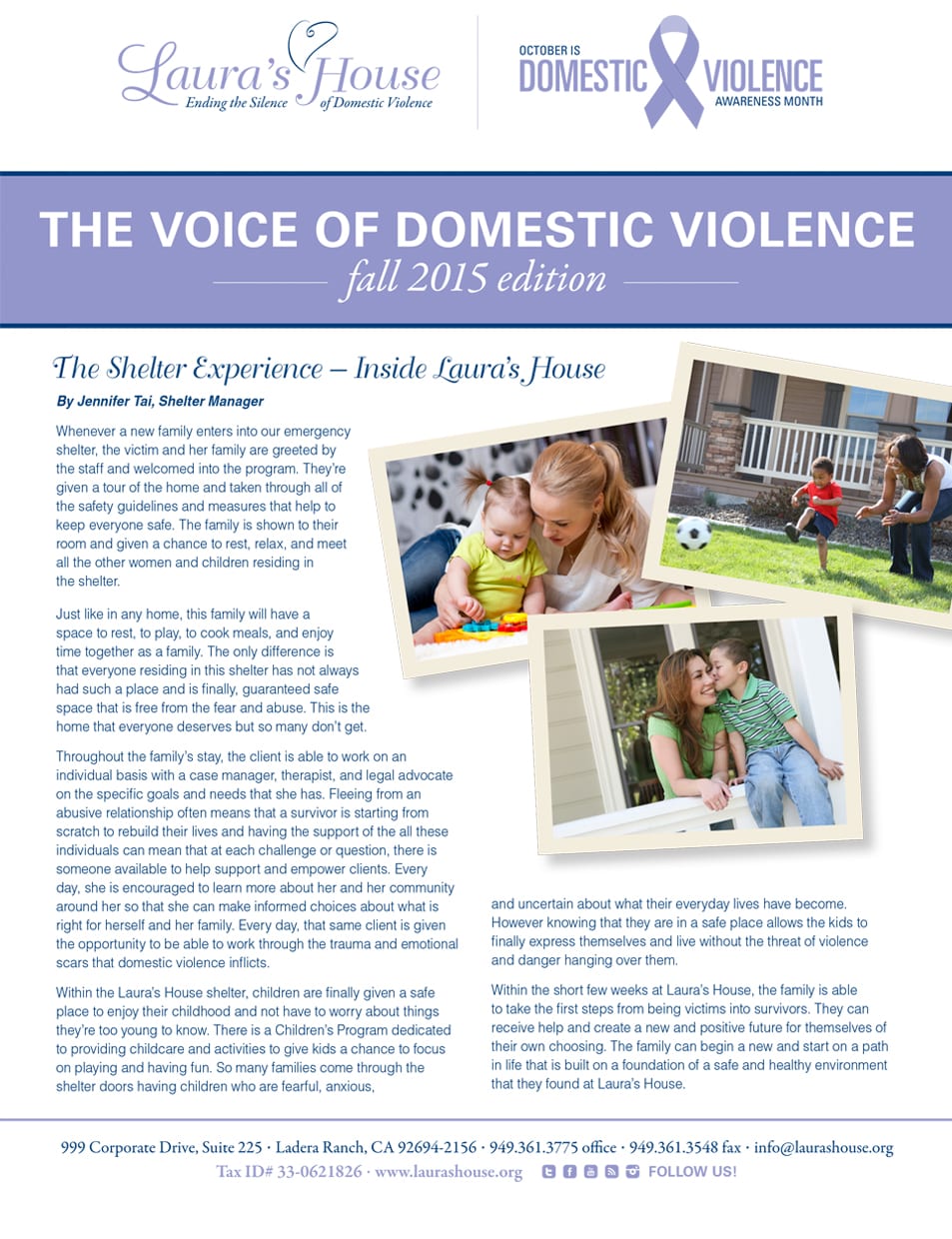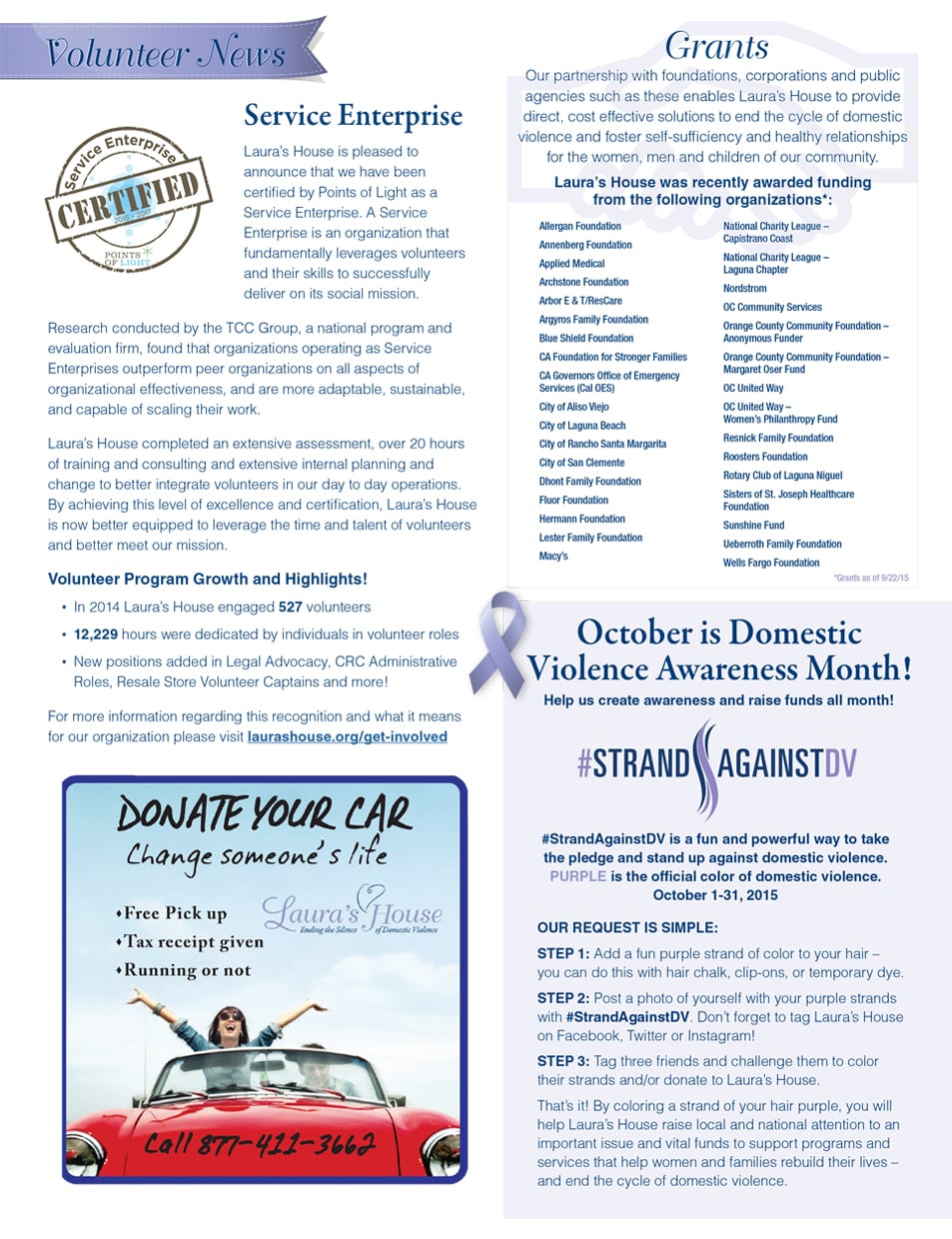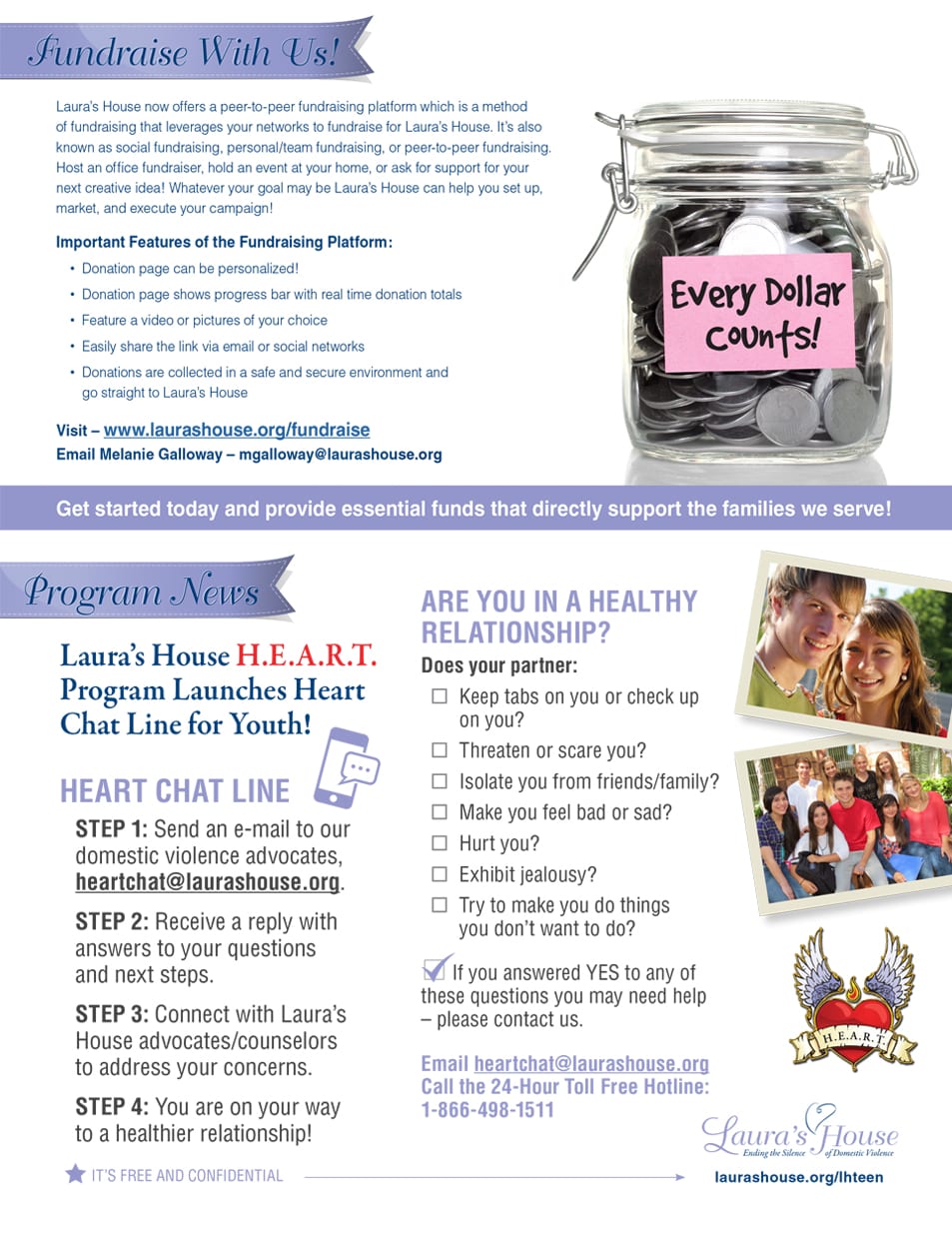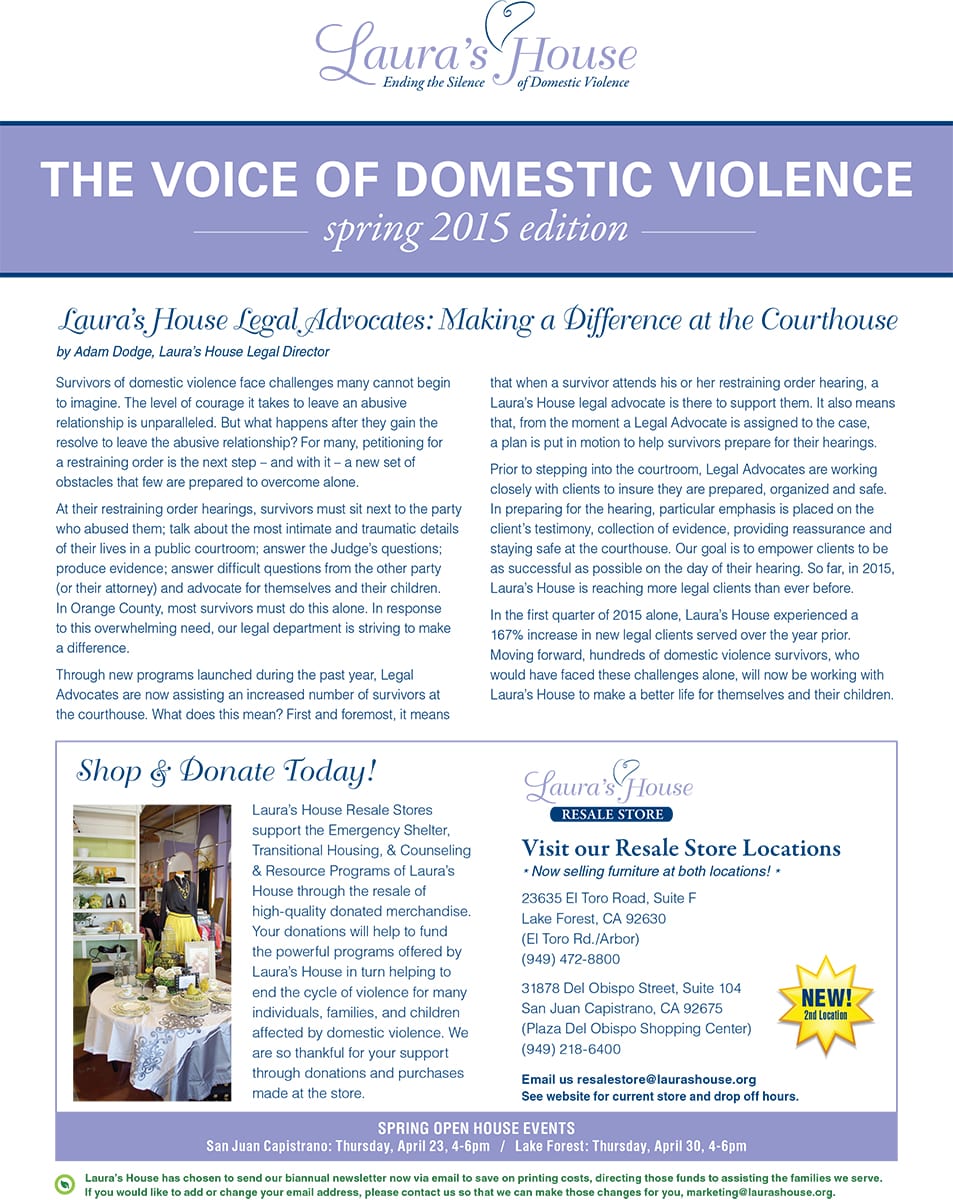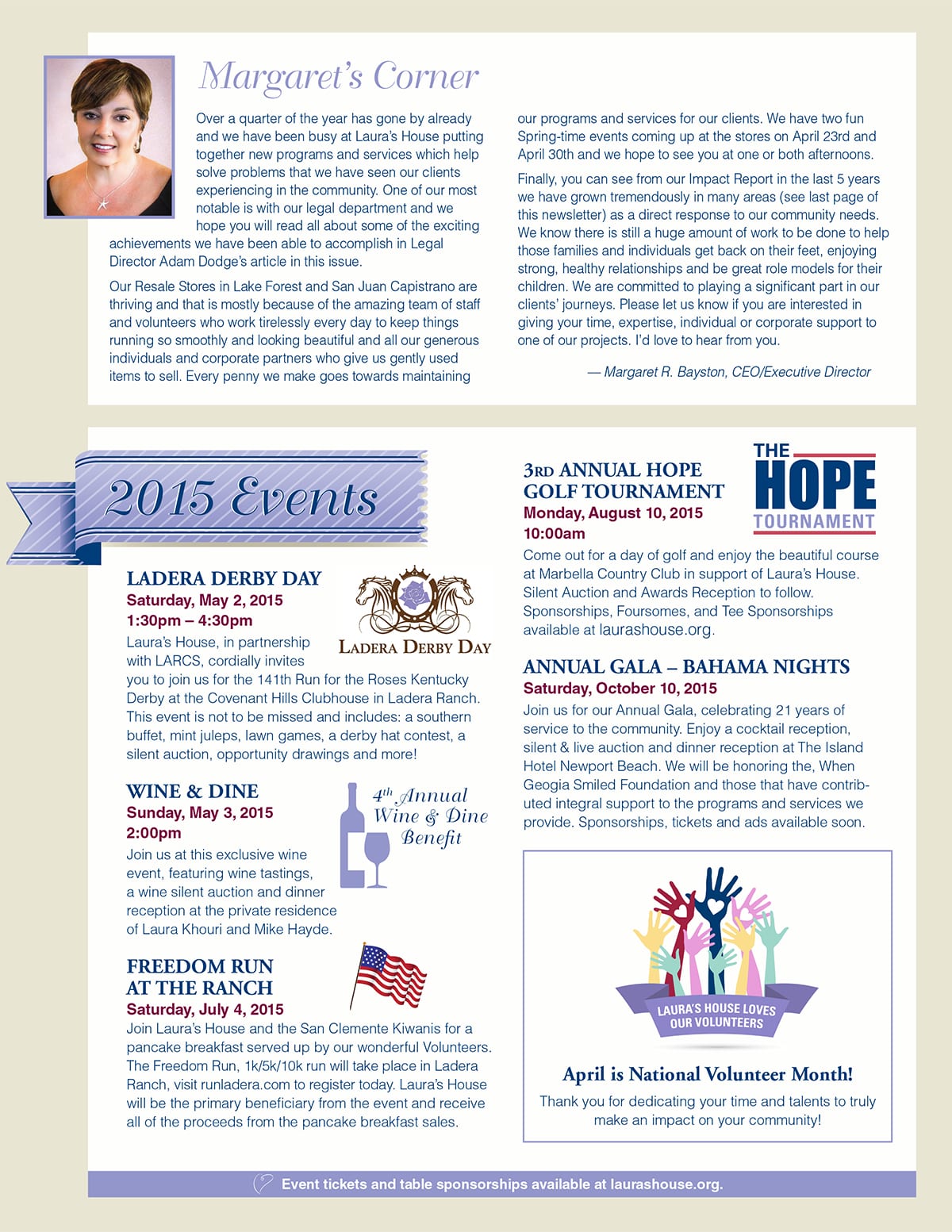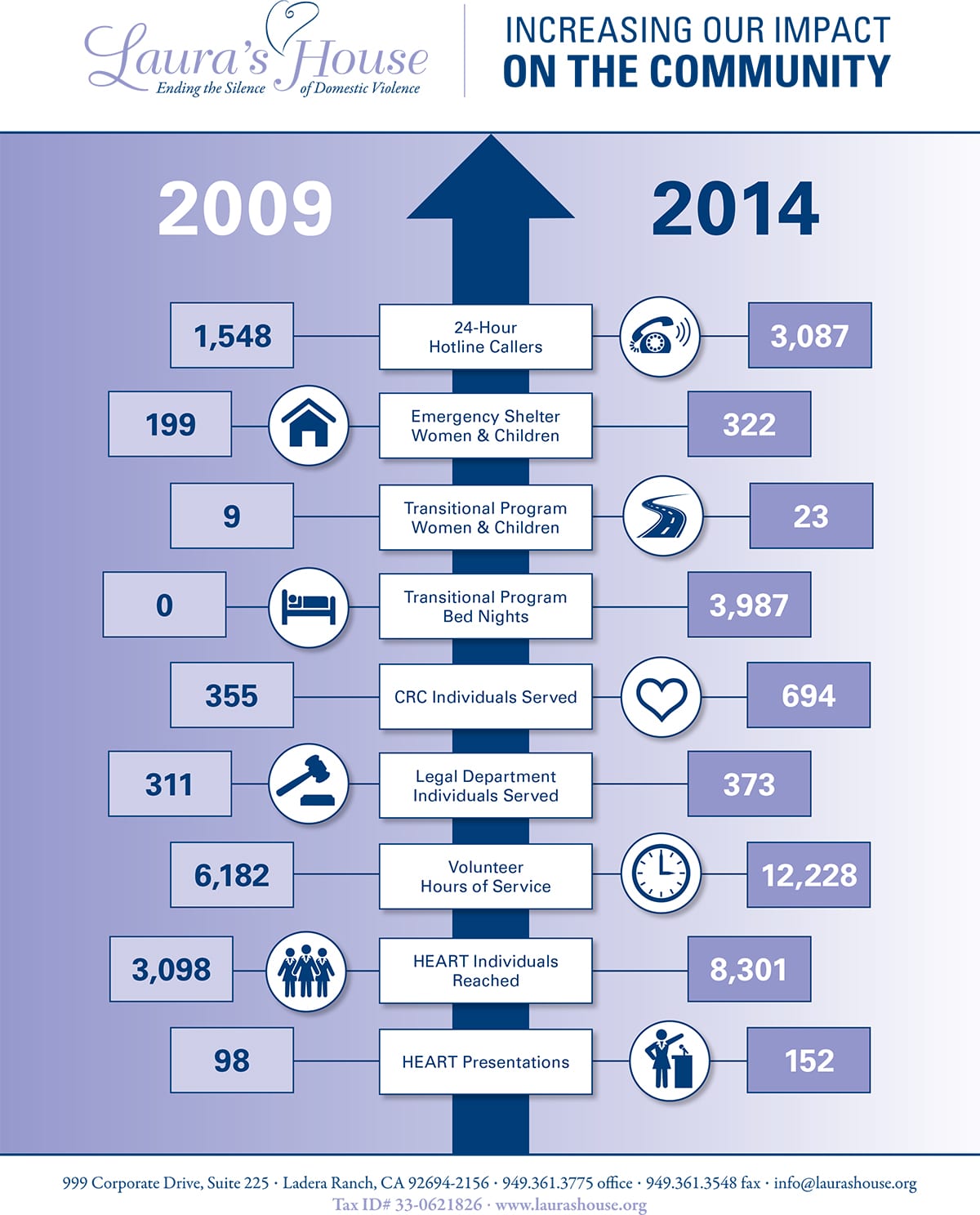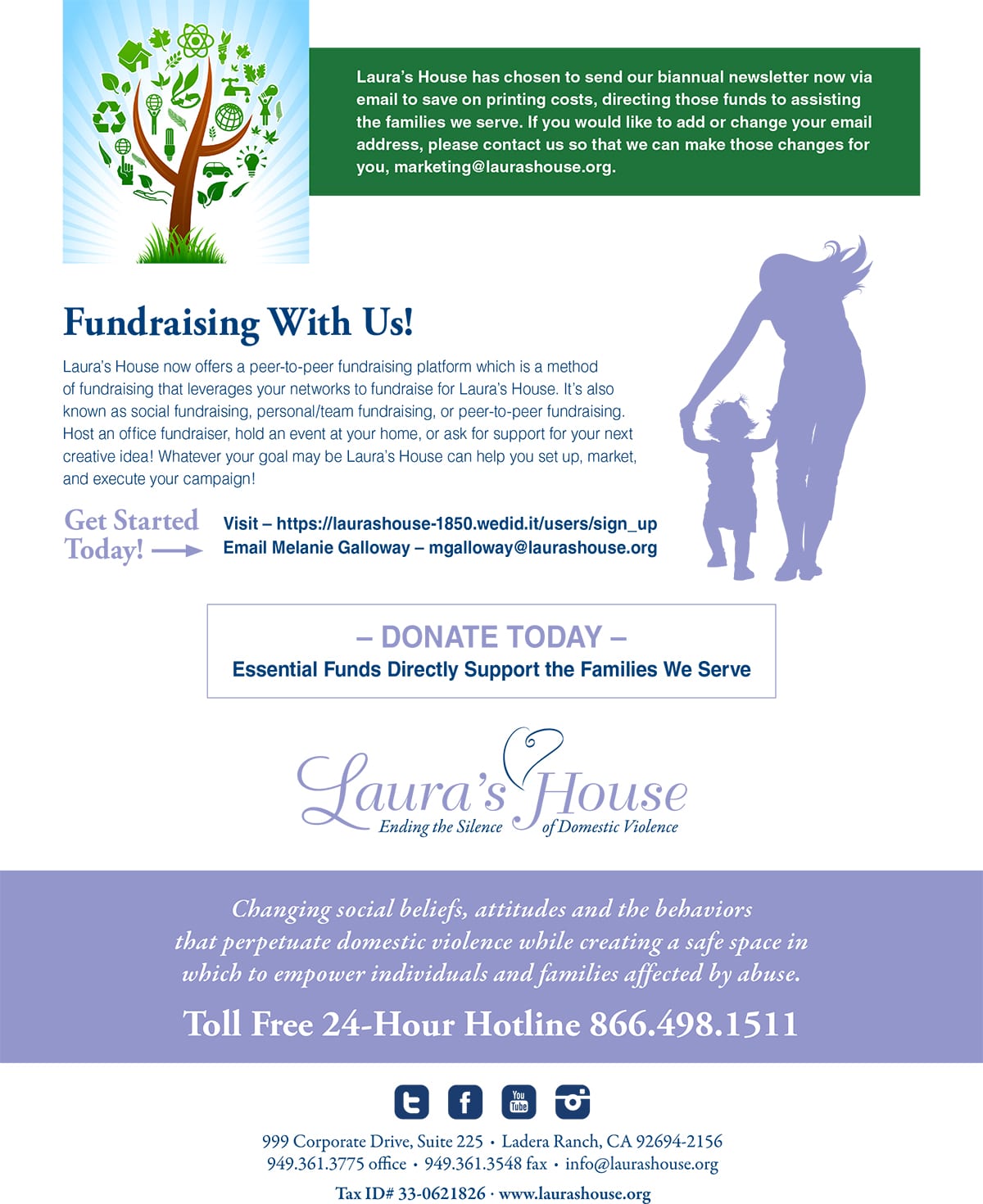Laura's House is now a Certified Service Enterprise!
Posted on September 1, 2015
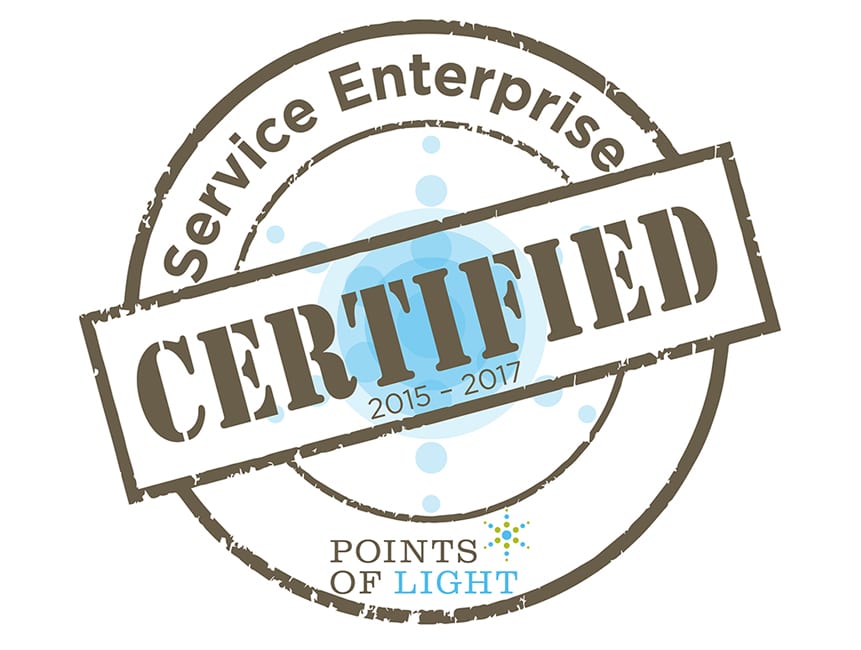
Laura's House is pleased to announce that we have been certified by Points of Light as a Service Enterprise! A Service Enterprise is an organization that fundamentally leverages volunteers and their skills throughout their organization to successfully deliver on its social mission.
Research conducted by the TCC Group, a national program and evaluation firm, found that organizations operating as Service Enterprises outperform peer organizations on all aspects of organizational effectiveness, and are more adaptable, sustainable and capable of scaling their work.
Laura's House completed an extensive assessment, over 20 hours of training and consulting and extensive internal planning and change to better integrate volunteers in our day to day operations. By achieving this level of excellence and certification, Laura's House is now better equipped to leverage the time and talent of volunteers and better meet our mission.
- In 2014 Laura's House employed 527 volunteers
- 12,228 hours were dedicated by individuals in volunteer roles
- New positions added in Legal Advocacy, CRC Administrative Roles, Resale Store Volunteer Captains and more!
For more information regarding volunteer opportunities with our organization, please visit https://www.laurashouse.org/volunteer-opportunities For further information regarding the Service Enterprise Initiative, please visit http://www.pointsoflight.org/service-enterprise-initiative
Threats of Revenge Porn - A New Way to Silence Survivors of Domestic Violence
Posted on July 27, 2015
By: Adam Dodge, Laura’s House Legal Director

When Alice first came to see me, she was terrified. She was trapped in a physically abusive relationship and needed help. Her boyfriend had threatened to send naked photos of her to all of her friends, family, and co-workers if she ever left him or told anyone. That threat perpetuated a cycle of abuse, which she endured for months before gathering the courage to seek help.
Alice is not a real person, but her story is based on an all too common fact pattern I see in domestic violence restraining order cases: threatened revenge porn. For those unfamiliar with the topic, “revenge porn” is defined generally as the distribution of nude or sexually explicit photos and/or videos of an individual without his/her consent. It is a humiliating and cruel practice designed to ruin lives. A topic receiving national media attention, revenge porn has been criminalized in 23 states and counting, most recently in California, with the February 2015 arrest of a revenge porn website operator.
However, it is the threat of distributing these photos or videos that is perpetuating intimate partner violence.
Imagine someone like Alice receiving a text message from her boyfriend while she is at work, which includes a naked photo of her and the words: “I bet your boss would love to see this. Now stop ignoring me and ANSWER YOUR PHONE!” She just wants to be left alone, but with a single threat, her day falls apart.
As U.S. Supreme Court Justice Samuel Alito recently stated, “Threats of violence and intimidation are among the most favored weapons of domestic abusers, and the rise of social media has only made those tactics more commonplace.”
This disturbing trend of using threats of revenge porn to fuel domestic violence has diversified the ways in which abusers exert power and control over domestic violence survivors, but there is hope. New laws and resources are continually being developed to combat this issue. Listed below are several preventative and protective measures available to people like Alice:
Removal from Google. You can now ask Google to remove your sensitive personal information - like a bank account number, an image of your handwritten signature, or a nude or sexually explicit image or video of you that has been shared without your consent - from Google search results. The form can be found here.
Contact the website webmaster. Even if Google deletes the website or image from its search results, the webpage still exists (Google is not allowed to delete a website). The site will still be accessible through the URL, social media sharing, or other search engines. As a result, your best option for removing all access potential is contacting the webmaster, who can remove the page entirely.
Contact the social media company. Social media giants like Facebook and Twitter have policies against revenge porn. Notify them immediately if this policy is being violated.
Seek restraining order protection. The restrained party can be ordered not to disseminate and destroy the photos or videos, along with general orders not to harass or contact the protected party without facing a penalty.
Research criminal laws. As mentioned above, many states have enacted laws making revenge porn a crime. A list of those states can be found here.
Don’t delete the evidence. Threats of revenge porn are often communicated via text, email, social media or voicemail. Communications like these are sometimes deleted immediately because they are offensive, humiliating, and the person doesn’t want it on his/her phone/device. Saving these types of communications can preserve critical evidence for a future restraining order or criminal case.
Say ‘no’ to photos/videos. Many of the photos and videos in revenge porn cases are taken with the individual’s consent or voluntarily shared with the other person. As revenge porn cases have shown, this is a huge risk.
Don’t blame the victim. Too often, we cast blame on the victimized party: “What did she think was going to happen when she texted him naked photos?” This is not her fault, and such thinking can isolate and re-traumatize the victim, causing her to be less likely to seek help in the future.
Be an advocate. Every time you read an article like this one, you can be a resource to someone in need. So many domestic violence survivors are unaware of all the legal protections and resources available to them. They may have been intentionally misinformed, isolated and/or have lost hope. Some do not even recognize the threat of revenge porn as abuse, but it is just that. Informed members of the community can make a difference. Connect them with a resource, share what you’ve learned, and be an advocate for someone.
1-866-498-1511 |
1-800-799-7233 |
Adam Dodge, legal director at Laura’s House, provides support and education to victims of intimate partner violence who are seeking information, guidance and assistance with the restraining order process and any related issues. Laura’s House, a nonprofit organization whose mission is to change the social beliefs, attitudes and behaviors that perpetuate abuse, offers legal services – in addition to emergency shelter and community resources – in English and Spanish to victims of domestic violence and elder abuse.
For more information on the Laura’s House Legal Department, visit: www.laurashouse.org/legal-services.
Congratulations on two Telly Awards for Laura's House
Posted on May 11, 2015

We are very proud to announce that we have won two Telly Awards in the 2015 (36th Annual) competition for the Laura's House 20th Anniversary Video.
2015 Bronze Award: Laura's House - 20th Anniversary
Film/Video - Non-Broadcast Productions - Charitable/Not-for-profit
2015 Bronze Award: Laura's House - 20th Anniversary
Film/Video - Non-Broadcast Productions - Social Issues
There are only two levels of awards given, Silver and Bronze. For more information on the Telly's, visit http://www.tellyawards.com/awards/ and see below:
The Telly Awards is the premier award honoring the finest film and video productions, groundbreaking web commercials, videos and films, and outstanding local, regional, and cable TV commercials and programs.
Our mission has been to strengthen the visual arts community by inspiring, promoting, and supporting creativity. The Telly Awards receive over 12,000 entries from all 50 states and 5 continents.
The Telly Awards was founded in 1978 to honor excellence in local, regional and cable TV commercials. Non-broadcast video and TV program categories were soon added. Today, the Telly is one of the most sought-after awards by industry leaders, from large international firms to local production companies and ad agencies. With the quality of non-broadcast productions, traditional local & cable television commercials and programming on the rise, along with the world of online video continuing to rapidly evolve, we are excited to see this year's class of entries.

